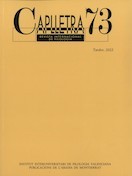The subject of non-finite verbs in Spanish: characterization problems and guidelines for teaching
DOI:
https://doi.org/10.7203/caplletra.73.24637Keywords:
sentence, non-finite verbs, subject, grammar teaching, GrOC Abstract
Abstract
In this paper we will deal with non-finite verbs that head sentences. The infinitive, gerund and participle forms have traditionally been associated with the categories of noun, adverb, and adjective, respectively. However, such parallelism does not imply a categorial equivalence: the fact that an infinitive occupies similar contexts to those of a noun phrase does not turn into a noun. We will see that non-finite forms constructions constitute bimembral predicative structures and, therefore, have a subject, although it is conditioned by the absence of verbal inflection. To understand the properties of the subject of non-finite verbs, it is necessary to insist on three basic grammatical notions: argument structure, null subject and locality. Based on this approach, we outline a content sequencing to teach non-personal forms in secondary school and we propose a sample of possible exercises of short sequences and minimal pairs. These exercises are based on a methodology that seeks to get students to reflect on grammar by linking meaning to form.
 Downloads
Downloads
Downloads
Published
How to Cite
-
Abstract443
-
PDF (Español)1472
Issue
Section
License
Authors submitting work to Caplletra for publication must be the legitimate holder of the usage rights. Legitimacy for the purposes of publishing the work must also include images, tables, diagrams and any other materials that may complement the text, whether they are the author of such material or not.
Copyright: on publishing their work in the journal, the author grants Caplletra. Revista Internacional de Filologia usage rights (reproduction, distribution and public communication) for both the paper printed version and for the electronic version.
All work published in Caplletra is covered by the Creative Commons license type Attribution-NonCommercial-NoDerivatives 4.0 (CC BY-NC-ND 4.0).
RESPONSABILITY
Caplletra. Revista Internacional de Filologia does not necessarily identify with the points of view expressed in the papers it publishes.
Caplletra. Revista Internacional de Filologia accepts no responsibility whatsoever for any eventual infringement of intellectual property rights on the part of authors.






